My mother had been a forager all her life. As a young girl in Crete, she foraged for snails and wild greens near the environs of her mountain village home. She did not forage for pleasure; she foraged for survival. When she moved to New Zealand, after the novelty of the New World had worn off with its mod cons and all manner of conveniences, she left her contract employment in Fielding and moved to Wellington (close to where most of the other Greeks lived in New Zealand). She continued to forage for snails and wild greens in the parks and green belts of the capital city, not for her family's survival this time, but because she longed for the taste of home, and it seemed a good way to pass the time on a sunny Sunday afternoon, a day which could be spent with the whole family, as hardly anyone except for the emergency services went to work on that day in 1970s New Zealand. She could never quite get that Mediterranean sun-kissed flavour in her Kiwi foraged food, but it came as close as she would ever get to it.
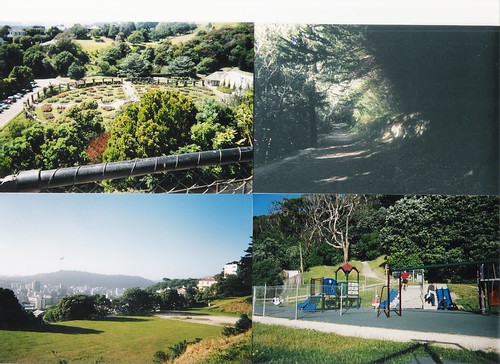
My mother had picked a lot of horta in her lifetime from these parks in Wellington; from top-left clockwise: the Botanical Gardens, Mount Victoria (does it remind you of Lord of the Rings?), Pirie St Park, Marjoribanks Park.
I always harboured a fancy to go back to Wellington and walk in my mother's footsteps, rummaging amongst the undergrowth for leafy greens, in what I believed was the clean and green environment in which I was brought up, 100% Pure New Zealand*, now the country with the world's largest usage of the poison 1080 (ten-eighty). So much for worrying about whether a dog has done its business in your foraging spot; you might, instead, like to watch out for green carrots and helicopters raining Class A poisons over what was once considered virgin territory. And that's not the only problem** in "clean green" New Zealand these days; the natural environment is being spoiled by the monstrosities that have been built** in coastal, mountainous areas, constituting eyesores for the intrepid nature wanderer. Sometimes, it seems the country is going to the dogs, especially when you read news like this*...
*** *** ***
Thankfully my experiences of foraging in Crete are not as scary as what nature-loving Kiwis have to agonise over when they find themselves amidst nature; having said that, my experiences are still, generally speaking, unpleasant. Foraging is dirty and very tiring: harvesting snails gives your fingers a slimy feel, digging up wild greens blackens your hands, picking blackberries and cactus figs can be itchy. Most of all, it is very tiring, as most of the time, your back is arched and you are stooping low over the earth, looking for one particular species among a host of others. For each serving of wild greens, think of at least an hour spent picking, sorting, cleaning, washing and cooking it; for a family of four, that's four hours of back-breaking work. The only positive side to foraging is that it takes place in amongst nature, in its wildest form: it transports you to the most basic form of life, your hands get stuck in the muck, and while you are engaged in this mindless activity (once you become an expert in what you are looking for and can spot it easily), you can meditate, sorting out your thoughts and clearing the clutter in your mind, which I suppose my mother must have done often while she foraged; perhaps she made up her mind to emigrate during one of these moments.The local people of Crete really love their locally foraged products: look at the prices (all in euro per kilo) they are prepared to pay for them - 5.50 for wild greens (which are now being cultivated, if that makes any sense to you), 4.50 for cactus figs (prickly pears), 5.99 for cured green olives, 5.60 for snails, among others. Then there's the locally produced food (which isn't foraged): 20-25 euro for a free-range chicken, 7-9 for goat meat (considered superior to lamb), 14-18 for graviera (yellow aged cheese), 6-7 for mizithra (curd cheese). Local food has never been cheap, whether it is foraged and/or produced in the same region (we're talking about less than 100 kilometres) of where it is sold. Foraged food does not constitute a treat for Cretans; the food on their daily plate practically always includes a foraged product. It may take the form of something that may not easily be bought (wild-growing greens are slowly being replaced by mass-produced cultivated greens) or something that comes from their own fields (like olives).
Such products have high demand, which supplies cannot always handle, especially in the summer months and festive seasons, when Athenian ex-local residents come to the island and purchase local produce in bulk. They do not pay these high prices for the 'snob' value of the product concerned, nor for the nostalgia it may invoke; they buy these products because this is the food they believe they should be eating, the same food they were raised on when they were living on the island before they moved away to larger urban centres. The same can be said for the local residents: they are proud to eat their local products, and will pay the going rate to have it, even if it is expensive, or forage/grow/raise it for themselves (CSA boxes are as yet unknown here).
*** *** ***
We were recently in the village to check on our orange trees. Next to our (unfenced) field is an (equally unfenced) olive grove whose owner lives in Australia. The Greek caretaker of the olive grove decided to move on, so the owner, who for some reason is now in need of cash, upgraded the field (he cleared it of all undergrowth) and put a price tag on it a few months ago. As property neighbours, it was only fair to ask us first if we were interested in buying this land. At 180,000 euro (for 6 stremmata), we knew we'd have to win a lottery ticket to be able to afford it (he's now dropped it to 130,000; no sellers as yet - I wonder why).
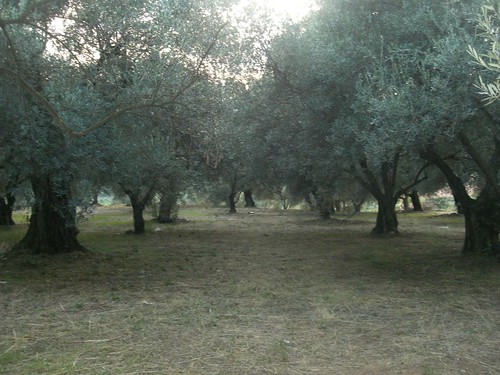
The olive grove next to out orange field (on the left; the change in foliage is barely discernible).
To recap: no caretaker, no owner, no landlord. The big fat drupes were hanging off the tree, just ripe for picking and turning into table olives. But there's no one to do the job. There weren't even any nets laid below the trees to catch the falling olives which would then be turned into olive oil. Many olives had already started to fall off the tree and rot away in the earth. They would never be picked, they would never be processed, they would never be eaten.
Oh, what a waste, I thought when I saw them, with a feeling of disgust, because I hate seeing good quality food going to waste; moreover, I could be eating them myself. I went to the car and bought out a plastic supermarket carrier bag (I never leave home without half a dozen in the storage pocket of the driver's door, along with a trusty knife in the glove compartment). I picked just enough to fill a couple of large jars of cured olives, which would probably last about two weeks in my house. I thought of all the ethical reasons that should stop me from taking these olives off the trees; it is akin to stealing, isn't it? But if I didn't 'steal' them, then they would have become fertiliser, and that, to me, constituted a greater moral crime than did the breaking of the commandment "Thou Shalt Not Steal".
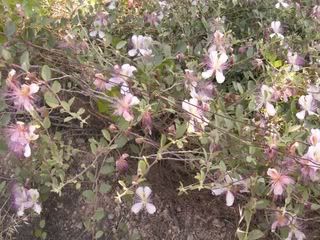
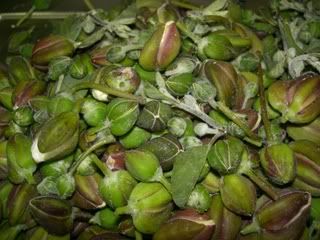
Caper bushes, found in abundance, bordering fields; uncured caper berries, freshly picked.
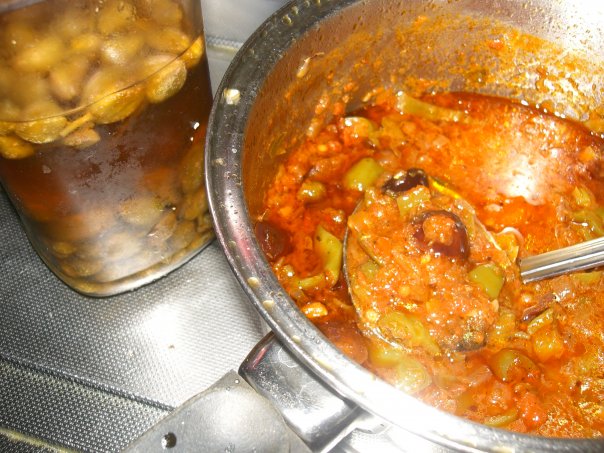
Once cured, capers are really delicious in a puttanesca pasta sauce.
As I carried my prize back to the car, I noticed the caper bushes growing wild at the borders of the field on the main road. They would never be picked either, especially since they are considered weeds by most of the locals. Poor weeds, I thought, as I placed the bag of olives in the car. I know just how to take care of them next June when they will be just ripe for picking.
Then I noticed the bramble bushes, growing wildly, completely out of control, sometimes acting as hedgerows, other times strangling orange and olive trees, but mainly causing a nuisance to trespassers. I remained unperturbed; there wouldn't be many blackberries to pick (blackberries in Crete tend to dry up very quickly due to the sunny weather), but they would be full of flavour, having grown under the glorious Cretan sun.
But my absolutely favorite 'free food' would have to be the one located on the school run: a rampant pumpkin patch that no one bothers to collect the flowers from. It's been growing on the same spot for two years, like a hedgerow in front of an olive grove in a mainly rural area just out of the new housing settlement of the village, which is constantly expanding. I pass this pumpkin vine every day, and every day, the roadside is filled with orange blooms that wilt away by the next day, when new ones come out.
One man's rubbish is another's treasure. Foraging sometimes feels a bit like breaking and entering when it involves crossing fields, but in my case, I didn't even need to trespass into the neighbour's property. The branches of the olive trees were hanging over the border between our fields, the caper bushes were next to the road where I parked my car, and so were the pumpkin flowers. Foraging of this sort sometimes feels like winning the top prize: you can procure some high quality free food, while at the same time acquaint yourself with the earth, which is becoming all the more an uncommon activity in an increasingly more urbanised world.
* These sites have been filtered and blocked by Google; thanks to Artanis** for bringing them to my attention.
** You will need a translator tool for these links if you don't read Greek.
©All Rights Reserved/Organically cooked. No part of this blog may be reproduced and/or copied by any means without prior consent from Maria Verivaki.
Oh, what a waste, I thought when I saw them, with a feeling of disgust, because I hate seeing good quality food going to waste; moreover, I could be eating them myself. I went to the car and bought out a plastic supermarket carrier bag (I never leave home without half a dozen in the storage pocket of the driver's door, along with a trusty knife in the glove compartment). I picked just enough to fill a couple of large jars of cured olives, which would probably last about two weeks in my house. I thought of all the ethical reasons that should stop me from taking these olives off the trees; it is akin to stealing, isn't it? But if I didn't 'steal' them, then they would have become fertiliser, and that, to me, constituted a greater moral crime than did the breaking of the commandment "Thou Shalt Not Steal".


Caper bushes, found in abundance, bordering fields; uncured caper berries, freshly picked.

Once cured, capers are really delicious in a puttanesca pasta sauce.
As I carried my prize back to the car, I noticed the caper bushes growing wild at the borders of the field on the main road. They would never be picked either, especially since they are considered weeds by most of the locals. Poor weeds, I thought, as I placed the bag of olives in the car. I know just how to take care of them next June when they will be just ripe for picking.
Then I noticed the bramble bushes, growing wildly, completely out of control, sometimes acting as hedgerows, other times strangling orange and olive trees, but mainly causing a nuisance to trespassers. I remained unperturbed; there wouldn't be many blackberries to pick (blackberries in Crete tend to dry up very quickly due to the sunny weather), but they would be full of flavour, having grown under the glorious Cretan sun.
Pumpkin flowers - filled with traditional rice stuffing for dolmades or yemista, they freeze well. Just remember not to defrost them before cooking: simply pour some olive oil/water over them, and place the pan into the oven straight from the freezer.
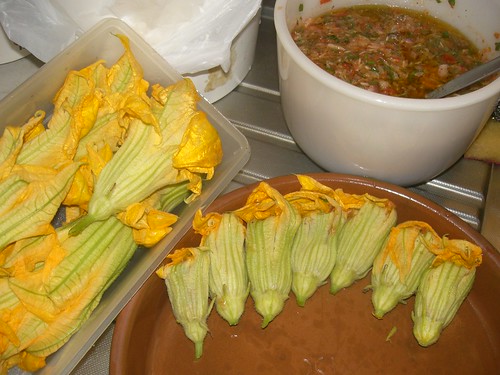

But my absolutely favorite 'free food' would have to be the one located on the school run: a rampant pumpkin patch that no one bothers to collect the flowers from. It's been growing on the same spot for two years, like a hedgerow in front of an olive grove in a mainly rural area just out of the new housing settlement of the village, which is constantly expanding. I pass this pumpkin vine every day, and every day, the roadside is filled with orange blooms that wilt away by the next day, when new ones come out.
One man's rubbish is another's treasure. Foraging sometimes feels a bit like breaking and entering when it involves crossing fields, but in my case, I didn't even need to trespass into the neighbour's property. The branches of the olive trees were hanging over the border between our fields, the caper bushes were next to the road where I parked my car, and so were the pumpkin flowers. Foraging of this sort sometimes feels like winning the top prize: you can procure some high quality free food, while at the same time acquaint yourself with the earth, which is becoming all the more an uncommon activity in an increasingly more urbanised world.
* These sites have been filtered and blocked by Google; thanks to Artanis** for bringing them to my attention.
** You will need a translator tool for these links if you don't read Greek.
©All Rights Reserved/Organically cooked. No part of this blog may be reproduced and/or copied by any means without prior consent from Maria Verivaki.
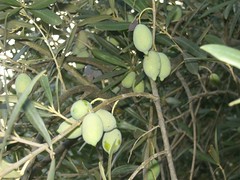



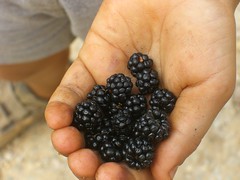


Morning!
ReplyDeleteI love foraging..always have..
we picked sloes, blackberries, wild apples, mushrooms, mussells, prawns(fished for)in cornwall.
Now, well, I'm not too good at recognising the right horta, but figs, grapes, blackberries, oranges, dill,olives, artichokes,walnuts, capers..all get picked. I hate waste.. the sight of fallen fruit is the worst thing. Of course I'm not stealing, like you, there are so many kypos left unused here.
I like how you always are prepared with bags and knife, a true forager! I enjoyed this post, as always.
ReplyDeleteIf only we could find pumpkin or squash blossoms growing wild I would be a happy camper!!!
ReplyDeleteGreat post Maria and I actually wish we could forage a bit more. I loved the description of your mom and the photos.
ReplyDeleteI enjoyed this post, Maria... it certainly pays to be prepared like you were with the bag for the olives.I used to go blackberry picking as a kid at my grandparents place. So many wild bushes, equaled lots of blackberry cobblers and jam!
ReplyDeleteWellington Mirkwood! Thanks for linking to the olives too. I made a jar of dreadfully bitter ones, so I'll have to try the soaking in water.
ReplyDeleteAlways having a plastic bag on hand for foraging opportunities is very important! Everything you say is true about the challenges of foraging, but still - it is one of my favorite occupations. Foraged food always tastes better - it's the something from nothing factor. Lucky you to find squash flowers for the picking!!
ReplyDeleteVery good post. you scared me regarding New Zealand...it is a dream for me to go there and you shuttered it.. sigh
ReplyDeleteI watch on tv the series Surf on the Menu and looks like paradise... such a pity...
Maria - a wonderful post.I only have to wander around my garden in late summer/early autumn for a daily harvest of blackberries.
ReplyDeleteSo that is what caper plants look like. I'm growing nastertiums from seed so I can not only have the leaves in summer salads, but pickle the resulting greeen seed pods. Some here may call this "poor man's capers" but I pickle them for their own sake - a peppery punch to add to dishes.
Your lemony olives look delicious. BTW the olives in Mt Victoria are now picked and processed into oil by the City Council, those that the locals haven't already picked!
Sending love, Michelle xxx
What a lucky girl! Foraging goods is the BEST. Such a great feeling of using something that will go to waste and getting your hands on top-quality ingredients. I am especially jealous of those squash flowers...
ReplyDeleteI could go for a plate full of stuffed pumpkin blossoms. I'm I'll find some here with what's left of the pumpkin crop.
ReplyDelete